Prithviraj Kapoor

Subscribe to read full article
This section is for paid subscribers only. Our subscription is only $37/- for one full year.
You get unlimited access to all paid section and features on the website with this subscription.
Not ready for a full subscription?
You can access this article for $2 , and have it saved to your account for one year.
- Born: 3 November, 1906 (Samundri, Peshawar, British India)
- Died: 29 May, 1972 (Bombay)
- Primary Cinema: Hindi
- Parents: Basheshar Nath Kapoor
- Spouse: Ramsarni Mehra
- Children: Raj Kapoor , Shammi Kapoor , Shashi Kapoor , Ravinder Kapoor , Devinder, Urmila
- Grand Children: Rishi Kapoor , Randhir Kapoor , Rajiv Kapoor , Sanjana Kapoor
Most memorable for his powerful, booming voice and regal persona evinced in roles such as Alexander the Great in Sohrab Modi’s Sikander (1941) and emperor Akbar in K Asif’s Mughal-e-Azam (1960), Prithviraj Kapoor is the first generation actor of filmdom’s famous Kapoor family, as well as founder of Prithvi Theatre. Actor, film producer, director, writer and politician, he started off acting in stage productions. In the 1920s he joined Imperial Films Company in Bombay, acting in the silent era of films. He went on to act in India’s first sound film, Alam Ara (1931). Playing lead roles through the 1930s, he starred in successful Calcutta-based New Theatres’ film productions such as Rajrani Meera (1932), Seeta (1933), and Vidyapati (1937), followed by Bombay’s Ranjit Studio’s successful melodramas. Staying committed to theatre, in 1944 he launched Prithvi Theatre in Bombay to promote Hindi plays. He gave many talents their first break through Prithvi, including director Ramanand Sagar, music composer duo Shankar-Jaikishan, and music director Ram Ganguly. His progeny is considered the first family of filmdom with four generations of Kapoors carving successful careers in cinema. Awarded one of India’s highest civilian honours, the Padma Bhushan in 1969, Prithviraj Kapoor was also posthumously awarded the Dadasaheb Phalke Award in 1972 for his contribution to Indian cinema.
Born Prithvinath Kapoor on 3 November, 1906, in Peshawar into a prosperous and respected family, his grandfather Dewan Saheb Keshomal Kapoor was the Tehsildar of Samundri town in Lyallpur district of Punjab. As his father Basheshar Nath Kapoor was a police officer with a transferable job, Prithviraj’s early years were spent with his grandfather, engrained in discipline, values and culture. When his mother passed away when he was only three, his father remarried and Prithviraj consequently had four stepbrothers – Trilok, Amar, Vishi and Ram. Schooled at the Anglo-Vernacular District Board Middle School at Samundri, he was 8 when he first appeared on stage as Laxman in a play on the Ramayana, and also keenly participated in sports. Joining Khalsa High School at Lyallpur, he passed his Matriculation Exams with a first-class. Enrolling at Edwardes College Peshawar, he made a name for himself in Dramatics, even becoming the Secretary of College Amateur Dramatics Club. He was even praised by the Chief Commissioner after a performance of The Boy Comes Home. He was just 17 when he was married to Ramsarni; their eldest son Ranbir Raj Kapoor was born in 1924, while Prithviraj was still in college. On completion of his BA in 1927, he sought admission in Law College, Lahore. However, he failed the first year due to lack of interest in the subject. Realising that theatre was his real passion, he faced family opposition to pursue acting as a career. He moved to Calcutta to join the Film League, a club to help land film assignments. However, when prospects looked dim, he turned to Bombay, the other hub of movie-making in the silent film era. Upon arriving there, he was guided by G K Mehta to Imperial Studios.
Prithviraj landed his first job in 1929, joining Khan Bahadur Ardeshir Irani’s Imperial Studios. Employed by the famous film company as an ‘extra’, he debuted with a small role in Challenge/ Do Dhari Talwar (1929) directed by B P Misra. It was followed by P V Altekar’s Wedding Night or Vasal ki Raat (1929). He landed his first lead role in B P Misra’s Cinema Girl (1930). He was paired onscreen with Ermeline, a popular silent film star. Following the success of the film, the pair was repeated in B P Misra’s Children of the Storm or Toofan (1930) produced by Sagar Film Company.
Kapoor went on to feature in India’s first talkie, Alam Ara (1931). Directed by Ardeshir Irani himself, the film is a landmark in the annals of Indian cinema, marking the revolution of motion picture technology by sound. But his stint at Imperial was ultimately unsuccessful. His interest in theatre saw Prithviraj join British actor Grant Anderson’s theatre company, staging Shakespearean classics and other plays. Travelling across the country as part of the troupe, Prithviraj eventually settled in Calcutta when Anderson’s company closed down. Here he was selected by the famous New Theatres Studios for several of their film productions, including Nitin Bose’s Raj Rani Meera (1933) opposite Durga Khote which became the first mythological to win an award abroad, Inquilaab (1934), the Debaki Bose-directed Vidyapati (1937), Manzil (1938) in which he played a negative role, and Dushman (1939) which saw him sharing screen space with the adored K L Saigal.
When Prithviraj returned to Bombay in 1939, it was as a famous star, to join the Chandulal Shah-owned Ranjit Studios. His fame increased with several hits such as the A R Kardar directed psycho-social melodrama Pagal (1940). He went on to deliver what is considered his career’s best performance in Minerva Movietone’s Sikander (1941) directed by Sohrab Modi himself. This epic film was set in 326 BC when Alexander the Great, having conquered Persia and the Kabul Valley, descends on the Indian border at Jhelum and encounters Porus, who stops the advance with his troops. Kapoor, with his handsome and powerful mien, delivered a thrilling performance as the legendary Alexander The Great, even as he and Modi cast as Porus unleashed their histrionic capabilities via the film’s dramatic, declamatory dialogue. Marked by lavish mounting, huge sets, and production values equalling Hollywood's best particularly in the spectacular battle scenes, Sikander was rated by a British writer as "well up to the standard of that old masterpiece The Birth of a Nation." With this film, Prithviraj set the bar high in terms of charm, grace and screen presence.
His passion for theatre unabated, Prithviraj was associated with IPTA as one of its founding members. He went on to establish his own theatre company, Prithvi Theatres on 15 January, 1944 in Bombay. It marked a new birth of theatre in the city, producing plays on a variety of topics such as Deewar on Partition, Pathan on secularism, Ghaddar on the plight of post-Partition Muslim refugees, Ahutee on a girl abducted during riots, Kalakar on a village girl marrying a metro-based artiste, Paisa, a play on the ills of wealth, and Kisan on the condition of farmers facing ruthless moneylenders. Prithvi plays were distinct for their path-breaking scripts, besides being well-directed and enacted. The theatre also groomed talents such as Shankar-Jaikishan, Prayag Raj, Randhir Kapoor, Rishi Kapoor, K A Abbas, Zohra Sehgal, Balraj Sahni and Mohan Sehgal.
Prithviraj continued to find success in films through the 40s and 50s, featuring in K Asif’s Phool (1945), Shree Krisna Arjun Yudh (1946), V Shantaram’s Dahej (1950), Awara (1951), Dahej (1952) and Mughal-e-Azam (1960), in which he essayed Emperor Akbar, and Harishchandra Taramati (1963). After his eldest son Raj Kapoor established R K Studios with his directorial debut, Aag (1948), Prithviraj acted in the studios’ Awara (1951). He continued to show his versatility in different kinds of roles, including comedy in Gemini’s Teen Bahuranian (1968) and his grandson Randhir Kapoor’s Kal Aaj Aur Kal (1971). Kapoor also acted in Punjabi films such as the National Award winning Nanak Nam Jahaz Hai (1969), Nanak Dukhiya Sub Sansar (1970) and Mele Mittran De (1972), as well as the Kannada film Sakshatkara (1971). Notably his father Basheshar Nath Kapoor also made a cameo appearance in Awara (1951). His performance as Emperor Akbar in Mughal-e-Azam is one of the most memorable in Hindi film history.
Nominated to the Rajya Sabha, Prithviraj Kapoor served as Member of Parliament for 8 years. Pandit Jawaharlal Nehru appreciated his contribution to theatre and cinema. In 1969, Kapoor was honored with the Padma Bhushan. Among other honours, his performance in K A Abbas’ Aasmaan Mahal (1965) won him an award from the Czechoslovakian National Academy of Arts and Music, while he also won the prestigious Sangeet Natak Akademi Fellowship.
Prithviraj Kapoor passed away on 27 May, 1972. Fondly known as ‘Papaji’, he left behind a living, thriving legacy of cinematic talent, in his sons Raj Kapoor, Shashi Kapoor and Shammi Kapoor, grandchildren Randhir Kapoor, Rishi Kapoor, Rajiv Kapoor, and Sanjana Kapoor, and grandchildren Karisma Kapoor, Kareena Kapoor, and Ranbir Kapoor.
References
Additional information courtesy: https://learningandcreativity.com/silhouette/prithviraj-kapoor/
-
Filmography (109)
SortRole
-
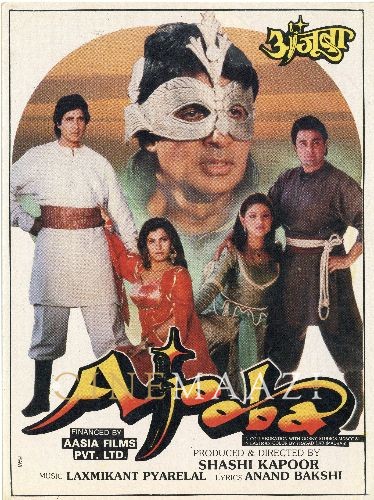
Ajooba 1991
-
Bombay By Night 1976
-
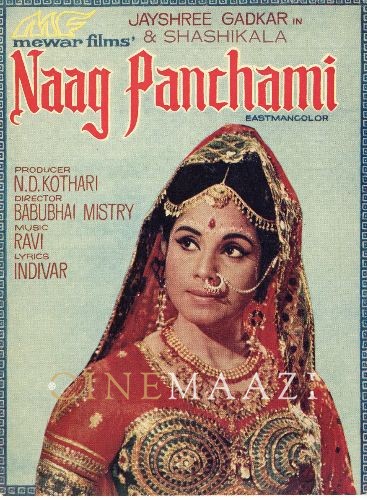
Naag Panchami 1972
-
Mele Mitran De 1972
-
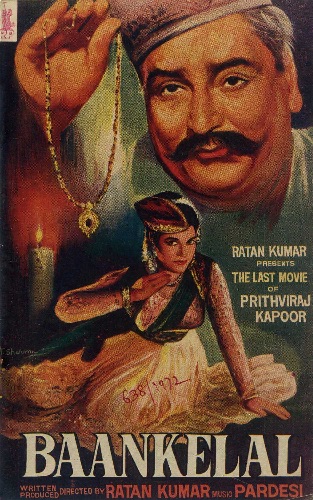
Baankelal 1972
-
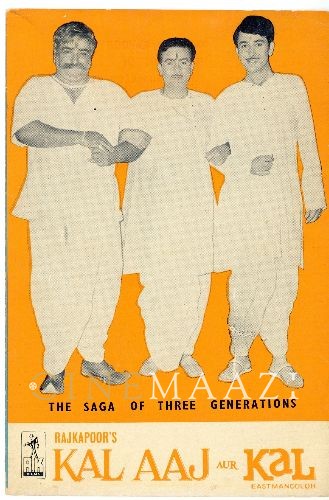
Kal Aaj Aur Kal 1971
-

Sher E Watan 1971
-
Padosi 1971
-
Gunah Aur Kanoon 1970
-
Heer Ranjha 1970
-






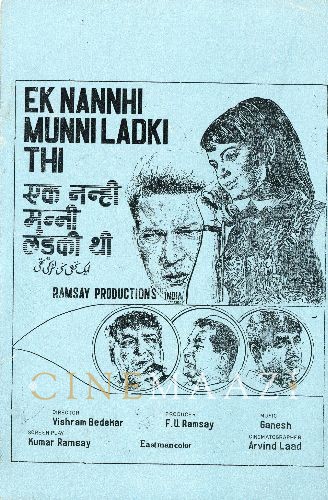


.jpg)



